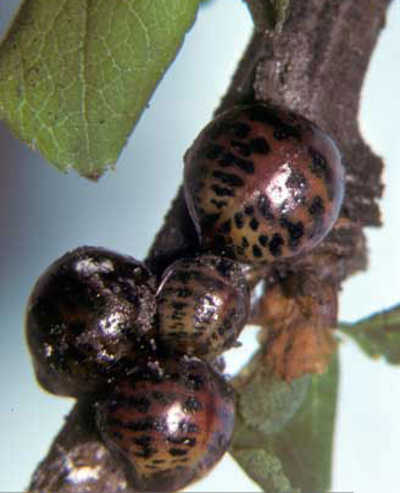
LAKE COUNTY, Calif. – At the Master Gardener Help Desk we’ve been getting a lot of questions about dark scaly sticky, bumps found on trees like pears and plums lately.
These bumps are insects known as Eulecanium kunoensis, common name kuno scale.
Kuno scale females are about 1/6 inch in diameter and almost spherical, resembling beads on stems.
Mature females are dark and shiny brown. However, prior to laying their eggs, they turn somewhat tan – orange-ish with black bands and blotches, as shown in the picture.
They produce a sticky honeydew that can attract both a black sooty mold and ants. If you notice ants in your trees or a black substance on your trees, look for Kuno scale.
The females produce offspring called “crawlers” during the spring, which migrate to the leaves where they feed and turn into nymphs.
Before leaf drop, the nymphs crawl onto twigs where they mature during March through May of the following year. This is when they become more noticeable as their populations can build up rapidly.
Kuno scale damage the plant by sucking the saps from the leaves and twigs. High enough population can cause trees to look water stressed. Long durations of infestations can cause the leaves to drop and twigs to die back.
You can control these critters by drenching the underside of the leaves with horticultural oil during the late spring and early summer when the crawlers are active or applying it to the tips of the trees during the spring just before bud break.
Also, control the access of ants to the tree as they collect the “honeydew” (sticky scale exudate) and will protect scale from their natural enemies. Ants can be controlled by applying a sticky barrier around the base of the tree. Do not apply oil when temperatures exceed 90°F or if trees have suffered from a lack of adequate soil moisture.
Both sticky barriers and horticultural oils come in a variety of brand names and can be found in most hardware stores and garden centers.
For more information on the life cycle and management of this and other common scales, see the UC IPM Scale Pest Note, http://ipm.ucanr.edu/PMG/PESTNOTES/pn7408.html.
Karole Ward is a UCCE Lake County Master Gardener.

 How to resolve AdBlock issue?
How to resolve AdBlock issue? 



